My Brother and I
Memories of Marianne Decker
Marianne Decker (21.06.1919 – 22.02.1984), nee Wunderlich, has written wonderful memories about her brother Fritz Wunderlich, who is nowadays regarded as one of the greatest tenors of all time.
Unfortunately, this writing exists only as a simple text. It has been made available by Fritz Wunderlich Society.
I have tried to process this text and to support it with photos.
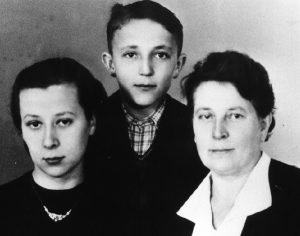
No significant changes have been made to the text. Only the word mein was generally replaced by the plural form unser
when it referred to Marianne Decker and Fritz Wunderlich’s parents in order to
The photos come from various sources, partly from the author herself. In this context, my special thanks go to:
– Mr. Piet Boers
– Mr. Fred Scharf
– and the Fritz Wunderlich Society
Unfortunately, not always authentic photos could be found. That’s why newer photos have been inserted. All black and white photos are historical pictures,
the color photos were taken in recent years. Perhaps the contrast of a 3/4 century is also interesting comparisons.
I hope that through this treatment of Marianne Decker’s memoirs, I have made this highly interesting text
vividly accessible to an even larger audience.
Arno Brijoux,
Lünen, March 2009
Prologue
When I write as his sister, about Fritz Wunderlich, it is because I am frequently asked by people who still admire him. “What was he like? How did he live before he stood on stage as a famous singer?”
I understand people wish to get an idea about him, as complete as possible, not necessarily out of curiosity, but simply, one had grown fond of him and taken him into one’s heart.
At this point, I would like to emphasise that I am not interested in becoming popular myself; I only wish to give a present to his admirers and to talk about the Fritz Wunderlich whom I have remembered since his birth.
If I had to choose the title of a book about him, it would be this one:
Listen, the lark is singing in the grove!
Why? One will realise it by reading this biography.
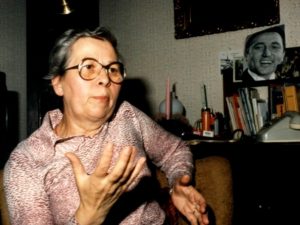

Marianne Decker, September 1980.
26th of September 1930 - the day of birth of my brother Fritz
Our parents had just (in the 1920’s, a bad time) moved to Kusel. Prior they had been employed as professional musicians in good cafés and cinemas. Especially coffee houses which placed importance on presenting good entertainment to their customers, therefore only hiring musicians who proved really good skills. The competition was great and one really had to achieve a satisfactory result.
Mother, born in the Erzgebirge, following a good education as a violinist, travelled aged 14 with a ladies’ ensemble to foreign countries., A good café house music was already established in these countries. Among other places, she visited Greece, Russia, Turkey, Jerusalem, in brief almost half the world. During this time, she became a violin soloist and founded her own ladies’ ensemble which became very popular.
Father, a real Thüringer (Thuringian), had been a military musician during the 1914 – 1918 war. After the war, he directed a big military band in Mühlhausen i. Th. Later, he was conductor of the Stahlhelmkapelle (Steel Helmet Band) which comprised of musicians from the military band.
After their wedding, parents joined forces and founded their own salon orchestra. Soon it became very popular and got many engagements.
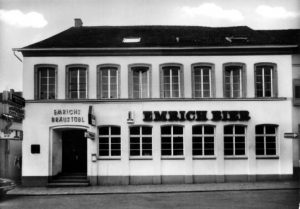
Modern technology, radio and sound film, made almost all professional musicians jobless overnight. Thus, our path led to Kusel. The reason was an offer in a newspaper for a Public House and cinema available for lease. For our parents this offer was not to be missed. Thus, they were able to keep to their professions. Radio and sound movies were in the advent of their invention and therefore, in Kusel there was no competition for the parents. Their performing music in their own house was so popular that visitors had difficulty in finding a place on Saturdays and Sundays. Father played cello, mother violin; a pianist was hired and they could delight their guests with violin and cello solos.
Everything would have been in perfect order, if the political turmoil of the years 1930 to 1933 had not contributed to destroying all that was beautiful.
Nevertheless, our father insisted on being happy about the birth of his son. On the morning of the 26th of September, he put a notice on the Public House door which read:
“Fritzchen has arrived today. Restaurant closed!”
The whole night long a celebration with friends took place and thus my brother’s life on earth began, which called for a lot of drinks.
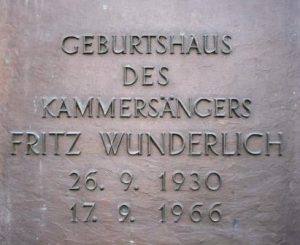
Childhood
Life went on and it had to be lived in the bad economic conditions of that time. If it were not for the parents making music, there would not have been much pleasure in Kusel at the weekends. Often there were bad fights, mostly for political reasons.
Father studied several operettas with amateur players. He was a good musician who could master harmonics extraordinarily well. He could write all scores for the respective instruments through the median of the piano. A lot of money could be saved, concerning the purchasing of scores. The operetta performances were a great contribution to Kusel’s society.
We children grew up in this environment. I was taught to play the piano and was busy performing with the parents. Fritzchen (10 years younger) was a little goblin who often had to be avoided. He was full of ideas for what could be got up to and how.
Oh yes – Fritzchen! – I believe, his first breath of air already contained the vigorous will to figure everything out, really everything which could be explored in this world. Thus, among other things, my beautiful puppet which had a wig made from mother’s hair, became a victim of his urge to explore. He smashed the puppet’s head to find out why its eyes could open and close. My carefully kept teddy bear, which had a buzzing voice, had to give its innards, so that Fritz could locate the sounds.
Our big long case clock; mother had forgotten to lock the door; was a dangerous target for his exploration. He stepped into it and toppled over with the clock. We heard the impact, rushed upstairs, where the clock had been standing and saw it lying on the ground, its glass smashed. Slightly shocked, my brother crawled out of it and whined again and again: “The lock is broken.” We, however, were just glad that the heavy weights had not killed him.
His curiosity for black shoe polish and what could be done with it, made him rub his whole head with it and mother had her hands full getting him clean again.
In the Public House was a billiard table. One had to put in a ten Pfennig coin to be able to play with the balls. The little squirt of a child, perhaps two and a half years old, could barely reach the lower edge of the bar with the tip of his nose. He opened the drawer and purloined the coins for the billiards, this done merely by touch as he was not able to see into the drawer filled with the daily receipts. Then he climbed onto a chair, took one of the billiard cues, put his coin into the designated slot and played so skilfully with the balls that it was a pleasure to watch him. With great delicate feeling, he shoved the cue through the fingers of his left hand and balanced the ball unerringly into the billiard table pocket. Out of sheer concentration small wet spots appeared on the chair under him. When mother locked the money source from him, he “vengefully” and secretly blocked up all the billiard table pockets with whatever materials he could lay his hands on. If a guest wanted to play, the table had to be turned completely upside down to get the pockets empty again.
The opportunity to develop his voice quite early on was given to him by the Labour Service which had been stationed in Kusel. Every day at noon the men would march past our restaurant to get their food in a school building. At this time, we usually sat in the kitchen at lunch and heard the Company singing from far. Fritzchen was always the first to hear them. He threw down his spoon, slipped down from the chair, ran through the kitchen and the public bar, out to the street. There he waited until the men came. Then he marched next to or in front of the Company leader and belted out the song of the Labour Service men in the purest of sounds. The lyrics which he worked out for himself – as he could not yet speak properly – were the following: “Da wa sin sun die strate, arra vittoria.” (“Und so zieh’n wir uns’re Straße, hurra viktoria.” – “And so, we’re trekking our street, hurra victoria.”)
Thus began his first “big appearance” as a singer. However, the way to the top was still a long way off.
Change of residence
Time went by. Did it really? Unemployment, random ideological thinking, hunger for power and the consequences of all this. It affected all of us. (Are we now not again experiencing, the continuation of all that, as if nothing, really nothing, had happened?)
Our parents had to give up the restaurant and cinema. The income did not even bring in the necessary amount for the rent which the brewery that owned the property demanded. The number of cinema visitors receded. There was a second cinema owner in Kusel who had better connections with the film distributors and so could bring in more attractive contracts. Father and mother were not used to ruthlessly battling their way through. They got into debt with the brewery and even their furniture was seized. We moved into a small tenement block next to a metal works.
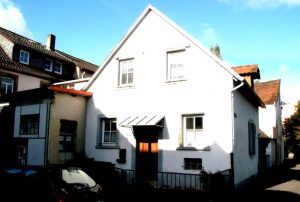
Our parents who had both taken their examination as music teachers in Kassel, were now working as private music teachers and the demand was really good. Pupils from the whole district took lessons in musical subjects and many instruments; so, in principal the financial concerns were lightened.
1933 – Hitler’s takeover. Everything was changed, many things were supposed to get better. What else shall I report about it – the history of the Third Reich is known.
Father was, on the basis of his certificates and knowledge, appointed leader and founder of a so called Wertungsorchester (assessment orchestra) by the Reichsmusikkammer (Reich Chamber of Music). All professional musicians from the Kusel district and beyond were registered and would preferably be assigned to public events. Father succeeded in assembling a big string and brass orchestra. He had great success as its conductor
Unfortunately, some less gifted amateur musicians were totally unsympathetic to father’s arrangements and because of their envy he did not get any peace. The leader of the SA- orchestra and a teacher from the Volksschule, who also conducted the music society for a short time were both intense NSDAP party officials, did everything to undermine father’s involvement.
The defamation towards him became even worse, when he received employment at that time as the music teacher at the Pro-Gymnasium (Grammar School) in Kusel. Probably also his activity as a conductor in the Stahlhelmkapelle which he had directed after the First World War in Mühlhausen i. Th. had become apparent. The fact that in an adjoining room of the Public House which my parents had managed before 1933, the party office of the SPD (social democratic party) had taken residence, reputed him as belonging to this party. I know that father and mother had never been involved politically. They consequently absented themselves from any political activity. Nonetheless: Seek and ye shall find.
So, father was being watched by snitches. For example, if he did not return the “Heil-Hitler” salute which had been forced upon us, or if he did not honour a flag delegation by saluting it “Heil-Hitler” with raised hand, the police were sent to his house. The whole family had to suffer a lot from these harassments. Added to which there was father’s severe war injury. Because of a shot in the stomach he no longer had an abdominal wall and had to wear a hard bandage day and night. The Landau maintenance council literally tortured him with check-up examinations. In the end father was a nervous wreck. He died in autumn 1935.
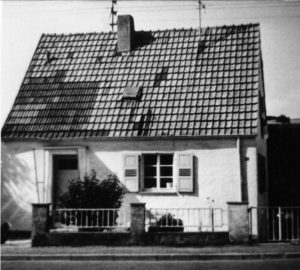
One thing I would like to mention: The NSKOV (Nationalsozialistische Kriegsopferversorgung = National Socialist War Victims Care) allocated the area of the up until then undeveloped local district “Holler“ situated on the outskirts of Kusel, for the building of small settlement houses. On the basis of advantageous credit conditions and working together with other settlers, our parents started building such a house. After father’s death, my mother had to finish it alone. She only received a small widow pension of 89 RM (Reichsmark). Although the prices for food and many other things had been much lower than nowadays, we had to pinch and scrimp. I have always admired mother how she defied all hardship for us children.
She had to deny many of the things which a young girl with little comprehension would like. Later in more peaceful times, I begged her forgiveness.
Nevertheless, determined as she was, mother forcefully tackled life. She taught instead of father at the Pro-Gymnasium, gave private lessons and played the fiddle together with fellow musicians at dance events in Kusel and neighbouring villages. Often, I went with her, playing the piano. Considering that we had no electronic systems at our disposal, which is effort-saving for present day entertainment musicians, it was very hard work.
As for the funfairs in the villages, we used to play mostly for three days – from the afternoon until late into the night. We had to reach our place of work on foot, or by horse-drawn vehicle, by train and only very rarely by car. In the night – exhausted by the treadmill of playing dance music, we were often forced to walk home dead tired. Once mother walked home totally alone at about three in the morning from a neighbouring village. Her fiddle in the backpack, she tracked intrepidly through a piece of forest. Her strong character to brave the weather, which is a trait to the people of the Ore Mountains, proved itself again and again.
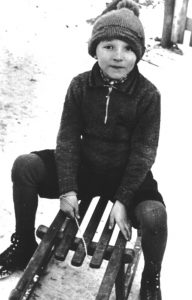
My brother now aged five years did not realise many of those difficulties in his childlike carefree state. He was always full of fun and contentment and could make a lance from every straw, build a castle from every pile of sand. He even helped mother with her violin lessons by indicating the notes on the piano so that the pupils could tune their instruments.
In spite of all hardship, mother never showed us the grief in her heart. She was a strict but also kind matriarch of our small family. Her influence in many complicated situations in my and my brother‘s life was of helpful importance.
From 1937 onwards, mother, brother and I lived in the finally completed settlement house: the kitchen, a big living room (which was supposed to be two rooms; father had had drawn it like that on the building plan), on the upper floor two bedrooms, in the cellar a toilet; apart from that a pig sty and a chicken house were included. It had been a condition of the NSKOV to keep cattle. Mother proved herself as a farmer, along with her musical work.
There is a reason why I am describing our home so exactly. Kammersänger (chamber singer) Hermann Prey has claimed in his book „Premierenfieber“ that he had been to Kusel with my brother. Herr Prey was never in Kusel! He would have met mother then. He got to know my brother in 1959 when mother was still alive. Fritz never denied his relatives to anybody.
Mr. Prey portrayed our house as a small miner’s house, the inner walls supposedly had not been rendered, there was a stepladder (instead of stairs) up to the upper floor, to Fritz’ room, with supposedly an old wooden bed, a rickety old table with a metal bowl and pot as furnishings.
Our house had like the conditions of that time, always been decent. The walls were rendered, and the stairs were normal wooden stairs like that can be found in any other house. In the upper rooms was older furniture. In one of the rooms, Fritz had then installed a photo lab. Thus, today one would call it his hobby room. By 1963 my brother had already established his own life. Mother lived alone. After her death in 1963, my husband and I promptly moved into the settlement house together with our youngest son. It is just impossible to have missed Mr. Prey. Fritz would never have stopped a visitor whom he brought along to Kusel, from coming to us. This was not his habit.
School time
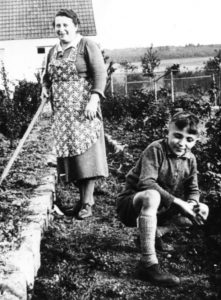
Back to Fritz, when he was still at home in Kusel. For him, life among the hens, the pig which mother raised, also the big garden and above all, the not much developed Holler area was a blissful paradise. Opposite the house was open meadowland, it came down to the nearby forest. A small tennis court, surrounded by high fir trees, was where he used to romp about with his playfellows often until nightfall. With great delight he played football, often until his old and unfortunately also his new shoes were falling apart. Later, during his student days, when he came home, his football mates were already waiting at his door in faithful anticipation.
Scarcely back at home, he collected his cherished old “gear” and gone he was, to the tennis court. Mother often scolded him, as she had been wanting to first speak with him alone about this and that. His charm like procedure of appeasement, however, which he used to turn on when somebody was angry with him, was enough to steady any inconvenient situation.
Immediately after my graduation, I was employed as an office apprentice at the Medical Health Insurance. I did not like the mundane office work which I had to do there. As a “restless” musicians‘ child, which I was, this kind of work gave me no satisfaction.
In 1937 I married and moved with my husband into his parents‘ house. I was still very young. Admittedly, mother was sad that I left her so soon, but we did not live far away and we could see each other almost daily. Furthermore, my husband was very helpful to her with garden work and repair work outside and inside the house.
Now my brother was living alone with mother in the little house, and I believe that was good. Both were a team which worked well together. No one and nothing disturbed them in their simple way of life. Fritz could develop freely and without restriction under his mother‘s patient observation; appropriate to his nature. The maturity which she had acquired through bitter experiences since her early youth, helped him to almost substitute his formal education: She was almost forty years old when Fritz was born.
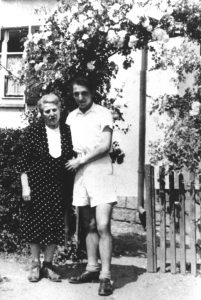
Fritz regarded school as a necessary “something”. Consequently, his innate gift for the fine arts came to the fore.
Senior Teacher Dr. J. Gerlach PHD, who had been employed as a teacher at Kusel‘s Grammar school after the war and later became its headmaster, extracted reports and assessments concerning the pupil Fritz Wunderlich from the school files. He put them together as follows:
Fritz Wunderlich
Fritz Wunderlich, born 26 September1930 in Kusel, entered the Staatliche Oberschule für Jungen (State High School for boys) on 18 September 1941. Already the assessment which had been submitted for the transition from the primary school, described him as a goodnatured, sociable, very amenable, ambitious boy and emphasised his agility and willingness in sports. His perception is designated as “very good”. Apart from his imagination and linguistic skills, his particular predisposition for music was already apparent at that time. His mother, an excellent violinist, who, all the more after the death of her husband, was a musically talented band leader, lived in humble circumstances, she was in permanent contact with her son‘s specialist teachers and could observe his “gratifying achievements”. In this subject he used to have really good grades. In the general report, his musical talent was highlighted again and again.
When after the war, after almost one year of school being cancelled, lessons started again, not even half of the subjects could be timetabled because of the lack of qualified teachers. Nevertheless, Fritz was well able to keep up. In his report from the Obersekunda ( Upper School) a long-term sickness of the “very gifted” pupil is mentioned. General necessity had forced him already during his term time to play in dance bands and so to sacrifice half nights which given the general nutrition situation impacted severely on his health. Luckily at that time he was mentored during his music lessons by the well-known Professor Dr. Müller-Blattau who had had to flee from the university city of Königsberg to Fritz‘ hometown of Kusel, where he had found accommodation and employment as specialist teacher for German and music at the Grammar School. He, too, had recognised and fostered Wunderlich‘s excellent musical and vocal talent. In the school orchestra and the Music Society orchestra he used to blow his favourite instrument, the French Horn.
Professor Müller-Blattau advised Fritz to study singing. The boy left the Grammar School to pursue his special vocation and after an initial musical education in Kaiserslautern, he then attended the music college in Freiburg i.Br.. The testamonial from Professor Müller-Blattau from the year 1950 appears like a literal prophecy about the then 19 year old young man. It stated “The musician Fritz Wunderlich possesses a natural voice of good level and natural melodiousness, furthermore an unusual musical talent. The education in Kaiserslautern to which he submitted himself, in spite of great external difficulties, has advanced him to the extent that he could take the microphone test successfully and was called on by the radio broadcasting for junior programmes. It is urgently required that with an education subsidy, he should be given the chance to accomplish a proper education without the harmful constraint of having to play dance music. It can already now be ascertained that after a completed education, Fritz Wunderlich will have a brilliant future as a singer.“
So far, the report from Dr. Gerlach.
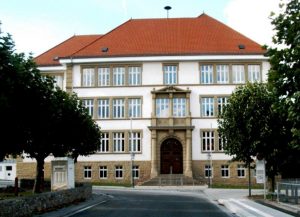
It is quite possible that the school laid the foundation for the interest in various subjects. Fritz proved this already as a small boy. With primitive objects, he installed a photo lab. During the war one could get no materials to make things that were necessary. For Fritz all this was not a problem. With keen eyes, he collected everything he needed for his experiments. He liked photography and developed his photos himself. His photo lab resembled the chamber of a “Dracula”.
He created a telephone for mother so that he could phone her from the upper floor. The old long case clock he made into an “alarm clock”. In the grounds of the dairy nearby he found strips of aluminium (with which the cups of cream were welded shut). He fixed such a strip to the clock face and connected it with a thin wire and a bell. The aluminium strip could be moved to the desired alarm time and when the hand touched the strip, the bell did its bit with exact punctuality.
It is impossible to relate everything how Fritz brought his ideas to fruition, often to mother‘s annoyance, because one had to be hellish careful not to get caught in the lines and connecting wires which were spread out in the whole house; let alone the mess which his “scientific experiments” left behind.
War
The Second World War. We all were suffering from it, too, especially from the air raids which happened without any early warning system as Kusel is situated too close to the French border.
Fritz was very afraid of them. He was helping a friend to build a tunnel in a convenient slope. This task helped him in overcoming his fear.
We experienced an attack from a small American bomber unit. On that day we all wanted to eat lunch in my flat which was close to the place where Fritz was helping digging the tunnel. Mother was on her way to me. On her way she was taken by surprise by the bomb attack. She fled into a bigger house and was buried there together with others seeking shelter. At the same time my brother was in my flat. After the bombs had fallen, he ran outside. It was a miracle to me that both mother and son had found each other in that chaos.
Anyway, he brought mother to me, we were overjoyed to be together again. It took a lot of effort to clear the debris, dust, sand and stones from mother’s clothes and hair. Thankfully we found that she had not suffered any injuries. A door joist had formed a kind of roof above her and kept the tumbling walls away from her.
Following that Fritz spent many hours in the air-raid shelter of a private house. He took his food with him. During the hopelessness of his time in the cellar, he carved his initials into his food and drink containers (aluminium kettle and canteen) and everything he had taken with him. If he had only known that all these things have remained dear mementos of him for us!
However, in spite of the turmoil of war and his fear of air raids, Fritz played his little accordion when and wherever he could. He was singing jolly and merrily along to it. Football did not suffer either.
Shortly before the end of the war, the order came to mother’s house, that Fritz had to be ready for transportation to the nearby frontline entrenchment. One was aware that this was a last desperate attempt to save what was thought to be still salvageable; so, old men and young boys, among them fourteen and fifteen year olds, were not spared.
Up to the day of the enlisting, the hours were agonising for all of us. When the time came, mother packed his backpack. Fritz took his little accordion and mother and son went to the train station. What were they both feeling? There are no words for it!
The farewell came. Fritz climbed into the transportation train which slowly set itself into motion. Then mother with all her available strength and all her courage took her son off the train. She took Fritz home again with her.
The next day, a slip of paper was lying under the front door. It had been written by the then Oberscharführer. Of course, Fritz was forced to be a member of the HJ (Hitler Youth). The strictest punishment was threatened. The days following, we were filled with fear.
There was no punishment. Is there a guardian angel? In the general chaos of war many a thing passed into oblivion.
1945 – the Americans occupied the Pfalz (Palatinate). There was a big question mark over all our fates.
My husband was a soldier in Russia. He was a member of the NSDAP (National Socialist Party) and I was afraid I would have to suffer because of it. So, I spent these critical days with my children, two years old and six and a half years old, with my sister-in-law, who lived in a neighbouring village of Kusel. There was an old limestone tunnel and we planned to hide there during the Americans’ arrival and during possible fights.
18th of March 1945 – my brother's Confirmation Day
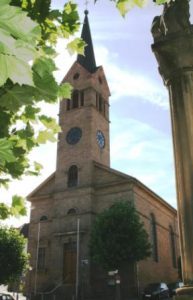
Mother had bought from parents of her pupils, among other things a confirmation suit for Fritz; in short everything which a confirmand needed. For the celebration she could procure sausage, meat, bread and cake, and we planned to spend this day as festively as possible. The evening before, we heard that our troops were retreating and the Americans had occupied the nearby city of Baumholder.
We were taken by surprise by all this. As I was not in Kusel, I could not make an arrangement with mother, where to meet. We had no phones, so we all were waiting, separated from each other, in great fear of the next day.
Around five o’ clock in the morning on the 18th of March, somebody knocked at the window of the room in which I was sleeping with the children. Mother and Fritz were there. They had spontaneously set off and come on foot to me and the children. They had wrapped the groceries for the celebration into a tablecloth but had left the confirmation suit and everything else at home. What was to be done? Of course, we were afraid but we were glad that we could all be together. Should we not take part in my brother’s confirmation? It almost seemed so.
In an impromptu decision, I fetched out of the suitcase which I had brought with me and in which there were also my husband clothes, his black trousers from his railway uniform, a white shirt, a dark blue uniform tie, a black coat and shoes. Fritz had almost my husband’s size, and everything fitted fairly well.
I reassured my mother. She remained with the children. Fritz and I borrowed two bikes from my sister-in-law and set off to Kusel to the city church. The route was about four kilometres long. I may be considered overly sentimental: I felt that our conduct had been guided by an invisible hand.
Fritz was afraid of air raids and I must confess, I was not any less. Calmly and fearlessly we both rode on our bikes along the main road until we got into the scramble of the German soldiers who were already on their retreat. We had to continue on foot.
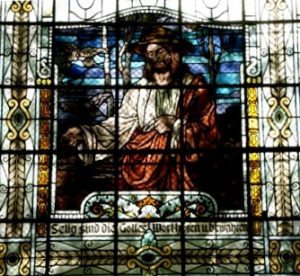
There was great confusion. In the distance, we heard the impacts of the grenades but unwaveringly we continued on our way. When we reached the church, we parked our bikes and entered the church which was filled to capacity. My brother went to his comrades and I got a seat near the side entry.
Now that I had rested a little, a pleasurable happiness arose inside me. I got to bring my brother to God’s altar, to have him blessed. I felt a good, honest sibling love at this moment and I thank God from my whole heart until this very day that had been granted to me.
During the vicar’s sermon, a grenade struck a hill nearby, and the church door burst open. The people in the church became a bit unsettled, but with surprising calm the fearless vicar finished his sermon. Subsequently without rushing, he blessed all the confirmands in a solemn ceremony.
After the Service, we took another route back to mother and the children. On our way, we met German soldiers who advised us to stay at home and not to flee.
Then we all, including my sister-in-law with her children, crawled into the old limestone tunnel. With anxiety in our hearts, we awaited what was to come.
The stay in the low passages of the tunnel, one could hardly stand up, was agonising and we all breathed easily again when word came that everything was over. Cautiously we crawled into the daylight. How was I feeling? The spring sunlight could not, like normally, make the hope for the beginning of new life soothingly light up inside me. The fear of the following days and months did not allow this.
During the course of the day, every one of us got our belongings and left for our homes. Exhausted as we all were, no one was thinking about the originally planned family celebration. Thus, my brother’s confirmation day came to an end which despite the great afflictions, instilled one thing in me, we have lived up to God’s will. I believe that Fritz had been filled with similar thoughts.
The post-war years
The Americans were rolling in their tanks towards the Rhine. There were no further fights with German soldiers in our region.
The following months and years were filled with the worry about our getting through. We had to deal with a lot of difficulties, as did so many people at that time.
Kusel was mainly occupied by French military. There were various incidents. Once I together with my children had to escape out of the house in the night away from a drunk American soldier. He was pounding against our front door with his machine gun until we saw no other solution than to escape. The youngest sister of my husband, who lived in the same house and also had two children, fled with me. Here I must raise a memorial in my mother-in-law’s honour. Courageously she let the angry drunkard in through the front door while we all could escape from him via another door. We got help from an American officer. The intruder was arrested. My poor mother-in-law had been spared from him. He had been searching throughout the whole house for the “daughter”.
At that time mother and I often had to play dance music in the French officers’ messes. Although we had to put up with a lot of unpleasantness because of this, it still was an enrichment for our poor nutrition. When I think about all those experiences; God never left us alone.
My brother who during the developing years of his young body, was constantly feeling the pangs of hunger, endured it all very patiently and in spite of it all, insisted on being merry and adventurous.
Mother was trying as much as possible, to keep bad things away. Her organisational talent proved itself especially in procuring food. Luckily this was also offered by parents of the pupils and she gladly accepted the long walks to collect potatoes, flour and other things with the handcart. When Fritz accompanied her, he would sit down on the roadside at the entrance to the village waiting until mother came back. His shame for acquiring food by begging was greater than his hunger. I believe he was so sensitive about this, he would rather have starved than to go begging. I was glad that mother could ease this burden for him.
How strong my brother’s sensitivity was and his warm-hearted nature, is indicated in the following incident:
My husband owned an almost new bike and he was very proud of it. At that time that was a rarity. Fritz borrowed the bike from me as he wanted to go on a cycling tour. Along the way, it was stolen from him. Mother told me later, his despair about this was devastating. Not until evening did he come home. Mother had almost died with worry about him. He had been sitting in the forest the whole day long and had not dared to come home. My husband was still in Russia. The thought that he would be unhappy about the loss of his bike was hard to bear for Fritz. Later when my husband came home from the imprisonment, sympathetic words freed Fritz from all feelings of guilt.
Education
Dr. Gerlach has already reported about Fritz’s school time. The question of a vocational training stood open. Mother was looking for an apprenticeship for him at the administrative district office. Furthermore, he took an entrance exam for the teachers’ seminary in Kaiserslautern. However, he took no delight in such studies. The administrative district office acceptance letter which he hid from mother under a pile of notes promised him an apprenticeship for a civil service career. Later he confessed to her.
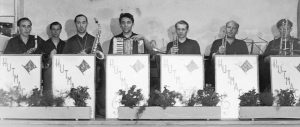
His sole interest was music. A dance band offered him the opportunity to play music. He played accordion and French Horn and felt fine among his eight to nine fellow musicians up until the encounter with Professor Müller-Blattau, who had ended up in Kusel through the turmoils of war, brought about a turn in his life.
Apart from Professor Müller-Blattau, a singing teacher had also moved to Kusel. She conducted the Protestant church choir. Professor Müller-Blattau had established a madrigal choir. Fritz and I were singing in both choirs
Already acknowledged by Professor Müller-Blattau from school, he was referred to the singing teacher, who was already enthusiastic after the first lessons. She confessed honestly that she could not teach him any more as he was gifted above average.
What followed now was the beginning of the way which was leading a young person step by step to be a world-famous man.
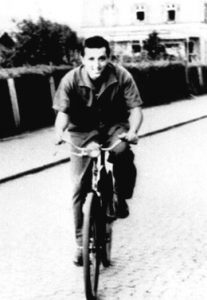
Fritz was looking for a singing teacher in Kaiserslautern. Money was scarce, and in order to save fares, the distance from Kusel to Kaiserslautern is 46 km, he constructed himself an old bicycle with solid rubber tyres and rode once or twice a week the almost 100 km (there and back) to the lessons. He did not receive many singing lessons there.
Freiburg i. Br. was recommended to him for music studies. To be able to finance this, mother saw no other alternative than to take a loan. The District Administrator at that time granted her a small sum which she later payed back. She even had to provide a surety guarantor.
Apart from this borrowed contribution, mother and Fritz received no support at all from his hometown! One may be offended by this statement of mine – I am only trying to portray this biography as truthful as possible.
After the death of the world-famous Fritz Wunderlich, patrons came forth who had never done anything for him, be it in a financial or other supporting way.
Supported by mother’s readiness to make sacrifices, my brother was working his way up with great diligence and blessed willingness to be a great artist. At best God’s working was involved; He had chosen him for this role.
I remember one of the merriest days in my life as being his last birthday which he celebrated at home, before he began his studies in Freiburg. When Fritz played at dance events, he used to buy waffle leftovers. These were scrapings of waffles which then were sold in colourful bags at funfair kiosks. His fellow musicians who were playing a serenade for his birthday, brought him a jumbo package of a hundred waffle leftover bags as a present. This charmed Fritz to compose impromptu the “Waffle Leftovers Opera”. Each musician had his instrument with him anyway. Fritz sat down at the piano and conducted the diverse entries. The lyrics and melody which emerged were full of humour and unique comicality, nowadays it would have been ready for the television. The clarinettist had tears running down his instrument while playing. I have regretted that this has not been tape recorded.
In Freiburg, my brother found the opportunity to devote himself entirely to what had been instilled in him from his earliest childhood, music and more music.
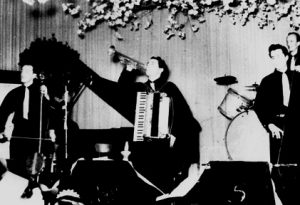
In spite of home sickness which afflicted him a lot, he was assiduous to self-abandonment and – happy. At the beginning of his student days, he earned a few extra D-Marks to support mother by playing music in a little student band.
Soon he received a state scholarship because of his extraordinary talent. He could, therefore, so to say devoid of material worries, devote himself entirely to his studies. His path along which he now continued, I do not need to depict it – the countless disc recordings and testimonials etcetera bear an eloquent testament.
In my memories I would now only like to dedicate myself to the young man who bestowed upon us experiences which made all our lives undefinable – and still…..
Musical studies in Freiburg
The post-war years demanded uttermost frugality from us. Provisions, especially meat, were still rare. Thus, we were glad when we could buy meat at the municipal Freibank (sales counter at the slaughterhouse selling low quality meat). My husband knew the butcher who was working there, so he got tips when cattle which had been killed in an accident, was being delivered and so had been butchered healthily. Mother could regularly send a package of home-roasted meatloaf to Fritz which his forever hungry stomach benefitted from very well. One day, however, mother received a letter of appreciation from Fritz begging her to send him no more meatloaf, but preferably something else. His roommate could not stand to see any more meatloaf now, let alone eat it. He was a gallant diplomat.
Another occasion, a telegram came from Freiburg, which was something unusual at that time. The fee for it would certainly have been regarded as being too expensive for Fritz’ means and mother hardly dared to open the telegram. She feared that something bad may have happened. The content of the telegram: “Have won a radio, your delighted boy!” The radio was a small Volksempfänger like were manufactured in the 1940’s and 50’s. Fritz received it for being the thousandth customer in a department store when he was buying a shirt.
Young people in this day and age would not understand what joy this “incident” stirred in my brother’s heart. And he had to share it with the mother. His characteristic trait which abundantly comprised humbleness and gratefulness came to the fore again and again.
Memories
When he would come to Kusel in the summer holidays, it was a nice and amusing time for my two sons. Again and again, Fritz devised something to do or to tinker with something extraordinary.
It was the autumn break. Fritz absolutely wanted to construct an enormous kite. Our boys and he obtained therefore the necessary materials from everywhere: big sheets of paper, wooden slats… I do not remember what else. On the football field the kite was assembled. The big moment for the launch came, the tension was enormous. The question, whether the construction would move up high? It did indeed – until the big bird’s individuality defied the wind’s very own strength and with a terrible roar shattered on the ground.
In the winter holidays they built themselves a big toboggan from old skis, two toboggans and planks. When the vehicle was finished, they pulled it up a steep path and mounted it as a group of four. With a loud “hello” the ride went down toward the valley to the end of the path. Unfortunately, shortly along the way the tediously put together “work of art” broke down with the whole party on it. Contritely they came home, each one with a part of their “ready to be patented” vehicle under their arm. Well, well – so one had yet to recognise limitations concerning one’s own skill for “inventions”.
These simple depictions of adventures may appear boring to some readers or be perceived as uninteresting. I would like to argue against this. For us, my brother was a gift in every respect which was enriching our simple rhythm of life. Far away from all the contemporary influences of any mass media with which people of our time are flooded, we experienced real genuine joy by his blessed ability to make people happy, which is leaving an everlasting deep impression in our hearts and which is irreplaceable.
Let us look again at the student in Freiburg. Fritz was working his way up step by step. Radio broadcasts brought his voice to the public and made people listen attentively. The airtimes in which his recordings of songs were broadcasted, were preferred by the listeners over other broadcasts. He was singing himself stellar like, into the hearts of all who listened to him.
In Freiburg, he often climbed up the Münster steeple, sat down in one of the towers which provided a view towards the west, so that he could picture the homeland in that direction. There he wrote and composed the “Kusel Song”.
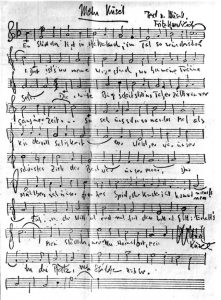
For a long time, the original document was lying in mother’s desk drawer. After her death, my husband found it while sorting through her property papers. He gave it back to Fritz.
Shortly before his death, this song was included into the last series of his disc recordings, together with some additional songs. His modest song which bore witness of his ties with his homeland, became a present for many people. The almost overcome home sickness was felt anew, and the song found enthusiastic admirers, even in foreign countries especially America.
It was an almost childlike love which linked him to his place of birth, but especially to his mother, which was the reason to give Kusel many a precious, memorable experience.
In a relatively short time, my brother got close connections to famous artists and conductors. The big radio orchestra became so familiar to him like once his fellow musicians. Thus some quite memorable events came about which he could facilitate in his little hometown. A short conference with the mayor of that time, who only had to give his consent and Fritz brought artists to Kusel who would never have come otherwise.
I can well remember a big “social evening”. Performers were among others: the big Südwestfunk (South West Radio) orchestra conducted by Emmerich Smola, Willy Schneider, a famous harp player, a comedian etcetera. The gym in which the evening took place, could not accommodate all the visitors. Of course, Fritz also performed. Actually, it was his first appearance in Kusel.
Less nice was the fact that mother had not received any free tickets from the town council and had to make her own effort to get tickets for us and herself.
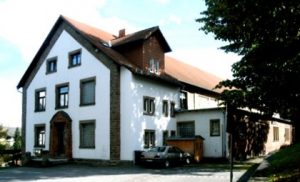
When at the end of the show I wanted a bouquet of flowers to be presented to my brother, this was not to take place because there had not been any flowers obtained for the other artists. Anyway, this did not stop me from having Fritz presented with the flowers. The town coucillors, however, had tried hard during the show to get hold of flowers from somewhere. Some carnations were acquired. They were given to the conductor, Emmerich Smola, who distributed them one by one to the soloists.
In my opinion these mishaps occurred because the designated organisers of the town council were not up to the task then concerning such big events and consequently awkwardly facing up to them. I am not interested in depicting my brother’s home town as being unworthy to have “hosted” a famous man; but still I would consistently like to point out occurrences which can take place behind the scenes, particularly if somebody somewhere has become a celebrity.
Although my brother had really no reason to be grateful to his home town for any funding, he loved his Kuselers and he still loved coming home when he was already world-famous to sing in a concert. The community college had then been the connecting link. Every time he let mother have his fee. Her birthday was the main occasion that such wonderful concerts had taken place in Kusel.
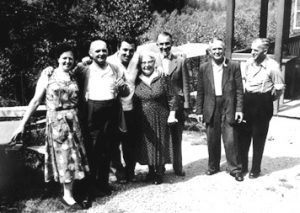
Many a reader of this short biography will probably suspect me of exaggerating when depicting my brother’s love of his homeland. I really do not intend to do this. There were many people who made his home town valuable to him, to which he devoted himself to a special degree, to which he always felt closely connected. He found a “father substitute” in a way in an elderly gamekeeper. There were friends whose honest comradeship withstood his famous name.
Certainly, he would also be grateful to those who raised a monument in his home town. I would like to address the question to those who gave cause for this: Does this also apply to the love of the famous man for his homeland, who always felt himself connected to the modest, unclaimed people, too?
I hope that this is the case!
Probably I have digressed widely from the depiction concerning a part of common living and experiencing with Fritz, my brother. I could only watch from the distance, his coming into being, his ascent into a world in which a mature man was living his artist’s existence,
He gladly came home to mother and to us to Kusel, as often as it was possible for him to enjoy it in its pleasant seclusion of that time. His coming, resembled the rise of the sun, his going, its setting. We experienced the most sociable and humorous hours with him and no one became tired in his company, however long we sat together.
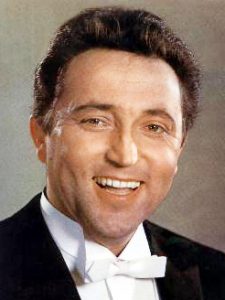
What a wonderful man the once little “Fritzchen” had become! His joy of living was simply flowing from him and spread to everybody who met him, and he was brimming with a vitality that swept everything out of the way, which may have harmed his creative power. His cheerfulness was combined with genial cordiality which indicated a genuine feeling towards his fellow human beings. Wherever he was, professionally or privately, his presence exuded joy and subtle humour which never degenerated into indecent exuberance.
In the deepest corner of his heart, however, there seemed to have been concealed an anticipation of what was his eventual fate.
Many a time I was there when he suddenly left a social circle. In his eyes a deep sadness could be read and he said softly: “Yes, yes, it’s all so sad.” When I witnessed him like this, great anxiety arose in me, I felt pure fear, that in his up until now so wonderfully guided life a turn could occur.
In order to bestow a final stamp on his personality: Fritz was a minstrel of God’s grace, who in integrity and sobriety, with the purity of an absolute hearing of the sounds, communicated to people whatever could be said through music. The most complicated operatic aria, the divine oratorios of great composers, of old and modern times, the simple song, all this was an expression of his soul, which was living through everything, truly everything and so disclosed every composition in perceptible authenticity.
Was he always all right with this? During a conversation with him, he once revealed to me, “You know when I’m standing on stage, I always have to put my skin at stake.” I believe, one will have to acknowledge this with gratitude.
In conclusion of this biography I would like to depict an experience which when remembering it, gives me hope again and again that every death must comprise of a wonderful new beginning.
"Listen, the lark is singing in the grove!"
Just to remember, on the first page of this biography I mentioned why I would choose this title as the title of a book, one of the wonderful Fenton romances from “The Merry Wives of Windsor”.
On a day in May my brother was on a visit to Kusel. Towards evening we got together to have a small party and, as usual, were having fun. We were in a small pub and when it was closing time, we wanted to ride home. It was a glorious, warm May night and the sky was clear.
Suddenly Fritz had the idea to ride to a small pub, located in the forest nearby. It was a wooden hut bearing the name “Adamshütte” and was very quaintly situated. We rode over the hill, which was not yet built up with barracks on the outskirts of Kusel to the forest hut. The way there was surrounded by thriving, beautiful bushes.
The hut was sitting on this hill, overgrown with big old trees. We were sitting comfortably at the open window, allowing ourselves to be waited on and would have expected nothing else, Fritz was the entertainer again, who could fight off fatigue.
Thus hour upon hour was passing, almost unnoticed, until morning gradually was dawning. Our conversations were slowly subsiding. Fritz also became quieter. Suddenly he got up, went to the door and we saw him walking down the hillside to a mighty old oak tree which was standing in the midst of the valley. He began, face towards the sun singing:
“Listen, the lark is singing in the grove…”
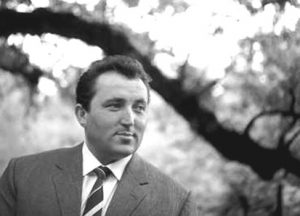
I went to the door of the hut, saw the modest man under the awe-inspiring tree, whose massive branches were tentatively filtering the rays of the morning sun, and heard him singing. His voice was permeated by the affirmation of life of this enchanting spring morning. The whole creation around him seemed to stand by him, so that he could express what he felt in his soul.
I drank in this song, as if it had just been composed in that very moment. The gorgeous backdrop, the birds’ jubilation, the soft blowing of the morning wind. No better orchestra, however good, could have accompanied the singer.
It was a unique Gloria!
Not one of us said a word and this stayed like this until Fritz joined us again. The emotion had made us silent. We rode home, each one of us with great devotion in our hearts. In later times, I often witnessed my brother on big opera stages, at church concerts, song recitals and many other performances. All that was only a substitute to me for what I had been given on that May morning.
For me, the remembrance of this is an indication to listen to the voice of the Creator of earth, even if it is becoming ever so loud around us. The song of the lark testifies joy and jubilation. That is what my brother has bequeathed me.
I wish the whole human race such forward looking experiences, in order not to lose faith, that time and again there will be larks, which God makes rejoice at the rising sun.
His death? …….. The fall down the stairs. There is a big question standing over this incident, which seemed to take from me the ability to believe in an almighty God.
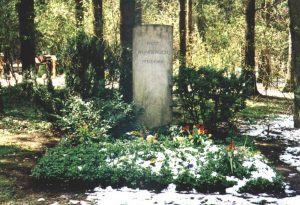
In the twilight of my life, I have only one answer to it. God lets man climb up to Him, to the verge of completion. but He determines the time of completion. We can only live patiently according to our destiny and beg the Creator to help us upwards step by step, which every one of us must climb. –
Something else I have realised: The variety of ways for God’s language to speak with the humans is great. Music attunes the strings of the soul, so that the innermost part of being can become in complete harmony. My brother was to be the helping hand, to make this a felicific reality. He was born into an age in which he was needed, like in every period of world process humans are born who contribute to the alleviation of essential birth pangs.
“Friends, life is worth living!”
Is not the one who could sing this song in such a brilliant pitch, a “herald of tidings of joy”?